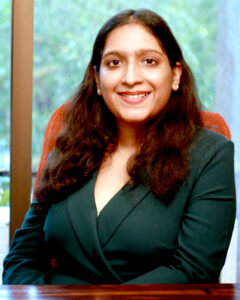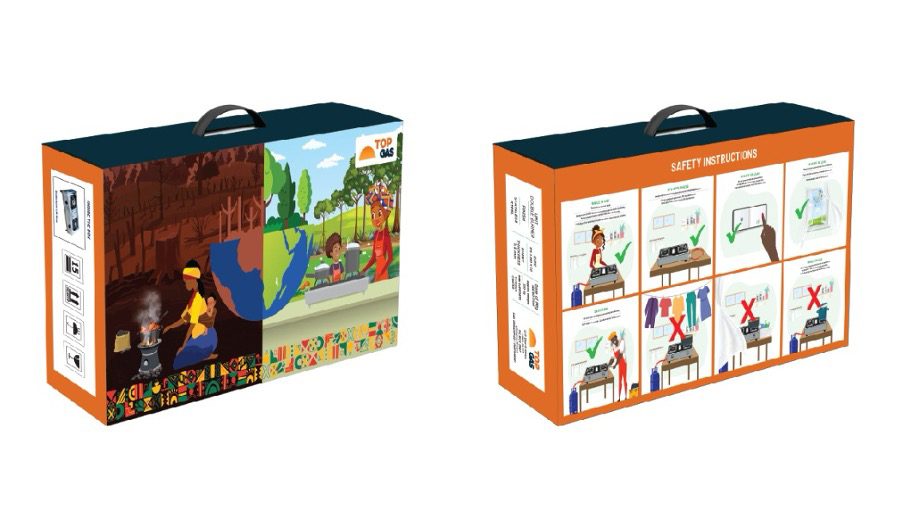Supporting Women in the Clean Cooking Value Chain

Aarthi Kanodia is the CEO and Director of Realflame, which produces and distributes liquid petroleum gas (LPG) stoves and electric cookstoves for clean cooking. The enterprise operates in 28 states across India, and Kanodia is responsible for expanding its business operations in India and international markets, including Africa.
The Clean Cooking Alliance (CCA) spoke to Kanodia about empowering women through the clean cooking value chain and using innovative means to educate young people about the benefits of clean cooking.
This story is part of a series showcasing women leaders in the clean cooking sector.
During Kanodia’s fieldwork in the clean cooking sector, she realized that clean cooking is not an indulgence but a necessity for every woman as the primary cooks for their households, “Women must be given time and space to pursue their passion and do things other than cooking. That was my calling,” she said. “I was determined to work in this industry to improve the situation of women and enhance their livelihood options.”
As the Director of Realflame, Kanodia tries to empower women by increasing their awareness about clean cookstoves and gainfully employing them in the clean cooking value chain. “At Realflame, women comprise 70% of the workforce and are all mothers. We have a motivated multitasking workforce, strengthening our clean cooking business,” explains Kanodia.
Kanodia’s intuition as a woman has helped her create and deliver more tailored solutions for other women struggling to cook safely. “I understand the urgency of fixing a cookstove before the next meal and the importance of efficient, long-lasting stoves for budget-conscious households,” she said. “Women inherently practice reducing, reusing, and recycling, so offering them efficient cookstoves aligns perfectly with their mindset.”

Kanodia approaches clean cooking as forming a new habit rather than selling her customers a product. “Convincing anyone to adopt a new habit requires more than just the product itself; it demands ease of access to the chosen fuel and a system that ensures comfort and availability,” she explains. Because women are keenly aware of their daily cooking challenges, they recognize its benefits and make informed choices once they experience a superior cooking method like LPG. However, for this to happen, they need consistent and easy access to the fuel.
Understanding the importance of creating different cookstoves to suit different cooking needs, Kanodia was keen on not limiting her firm’s production to just LPG stoves. In 2021, Realflame got an opportunity to team up with Finovista and Modern Energy Cooking Services (MECS) to promote electric cooking. “We collaborated on several projects with Finovista and MECS to ensure the supply of induction cooktops and electric pressure cookers to diverse markets,” Kanodia said. “Motivated after visiting Cape Town in 2017 for a conference, I saw a parallel between Africa’s current energy challenges and India’s past struggles. That inspired me to forge a synergy between India and Africa in the energy sector. Identifying and implementing solutions from India’s experience to address Africa’s challenges is a pursuit that brings me immense joy. Today, we are supplying cookstoves in 11 African countries.”
[ Read past entries in CCA’s Women Energizing Change Series. ]
Kanodia urges other stakeholders in the industry to view clean cooking beyond supply chain mechanisms and access to technology. “I have witnessed first-hand the impact of an enabling clean cooking ecosystem, wherein government support, last-mile delivery, and economic subsidies can truly increase access to clean cooking technologies,” says Kanodia. Cookstove quality, however, remains paramount. “The quality of clean cookstoves is critical as their efficiency and sustainability greatly influence consumer decisions regarding fuel types. The initial interaction with the product is crucial,” she said.
As the adverse effects of polluting cooking methods impact children and their health, Realflame strives to build awareness from an early age. “Our approach at Realflame extends beyond product development. We leverage our packaging as a platform to raise awareness about the importance of clean cooking while exporting our products,” she said. Realflame’s product packaging features animated images of women cooking with firewood. They also include various games on product boxes to pique young children’s interest in clean cooking.
Hopeful to expand LPG markets further, Kanodia is optimistic about the potential eligibility of LPG stoves for carbon credit programs. “The clean cooking sector is making significant progress towards a carbon-neutral environment,” she said. “If carbon credits earned from LPG cookstoves are used as subsidies to lower daily fuel costs, the LPG business could experience tremendous growth and get funding through carbon credits, making it self-sustaining. Only when the government and private industry collaborate can a massive shift that benefits each household in developing countries be felt.”
To other women in the industry, Kanodia has one main piece of advice: have confidence in oneself. “I witnessed a considerable increase in women working in our industry while attending clean cooking conferences,” she recalled. Each time I connect with these women, we share a sense of equality and mutual satisfaction that this industry provides us with, both in terms of our accomplishments and direct or indirect contributions.”
